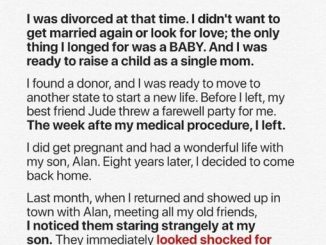A peaceful hike turned shocking for a South Carolina woman who came across a “beast” hiding along the edge of a creek.Wanting to warn others to be extra cautious when hiking through Jeffries Creek Park, Meredith Langley shared a photo of the massive creature on Facebook, horrifying many online users.“He’s probably swallowed somebody’s child already,”
writes one netizen who vowed to never go hiking again. Keep reading to learn more about the creature Langley found!Meredith Langley was hiking through Jeffries Creek Park in Florence, South Carolina, when she came face-to-face with frightening fauna who interrupted her enjoyment of the flora.A giant brown snake – several feet long and thicker than the root of a tree used to rest his head – was hiding in the dirt along the edge of the creek.The snake – that was catching some rays of sunshine – shocked Langley, who wrote on Facebook, “Note how well he blends in with his surroundings.”

“This was a good teaching opportunity and example for my own kids who forget not to run ahead of me on trails!” Langley writes to members of the private Facebook group, South Carolina Hiking Club.“This was a good teaching opportunity and example for my own kids who forget not to run ahead of me on trails!” Langley writes to members of the private Facebook group, South Carolina Hiking Club.The beast, that she estimates is about four to five feet when stretched out, was “wholly unafraid of us.”“It watched me with stillness and reserve, and without aggression or fear. That told me that this creature knew with certainty that it was capable of defending itself if needed, but it need not exert that energy unnecessarily,” Langley said of the monster, who she captured on film before she quietly retreated. “That area is its home, not ours, and my children and I maintain that respect and reverence anytime we are out in nature.”‘What a beast’The online community was horrified when they saw the fearless snake, resting along a common hiking path.Believing her eyes tricked her, one netizen writes, “What is that?” and another says, “This photo is not selling South Carolina.”Others are in awe of the snake’s size. “What a beast!” one writes.“This looks like something you’d see in the Amazon jungle,” said a second while a third simply stated, “Dats a whopper.”One person jokingly commented, “He’s probably swallowed somebody’s child already,” adding, “I ain’t going on NO trails period.”Meanwhile, other cyberfans tried to identify the snake’s species, “That’s a huge cottonmouth,” shares one user. Cottonmouths are highly venomous vipers, which along with copperheads are frequently found in the area.

The kil ler snakes, also called water moccasins, are often confused with their nicer relatives, like the brown water snake.
Sharon Osbourne says ‘we all let you down’ as she asks major question to industry after Liam Payne’s death

Sharon Osbourne said her’ heart pangs’ following Liam Payne’s death
Sharon Osbourne thinks the music assiduity’ let you down’ in her heartbreaking homage to Liam Payne.
Payne, 31, was set up dead after falling from a third bottom deck of the Casa Sur Hotel in Buenos Aires, Argentina, on Wednesday( 16 October).
A posthumous examination report showed that the songster failed of multiple traumas and’ internal and external haemorrhage’.

Former The X Factor judge Osbourne made a guest appearance in 2010 to help Louis Walsh at the judges’ houses phase of the competition.
That same time, Payne rose to fame on the show, alongside Harry Styles, Niall Horan, Zayn Malik and Louis Tomlinson, when One Direction was formed.
In a homage participated on Instagram, Osbourne wrote” Liam, my heart pangs. We all let you down.”
Questioning the music assiduity, she added” Where was this assiduity when you demanded them?
” You were just a sprat when you entered one of the toughest diligence in the world.
” Who was in your corner? Rest in peace my friend.”
Previous to the songster’s death on Wednesday, police participated a paraphrase of calls made by hostel staff asking for backing for a guest who was’ intoxicated by medicines and alcohol’.
In a statement, police said Payne’s hostel room had been’ in complete disarray’ with’ colorful particulars broken’.
Argentina’s National Criminal and Correctional Prosecutor’s Office are pertaining to the incident as an’ inconclusive death’.
Last night,( 17 October) Louis, Zayn, Niall and Harry, put out a common statement following their former bandmates death.
” We are fully devastated by the news of Liam’s end,” it read.

” In time, and when everyone is suitable to, there will be further to say. But for now, we will take some time to suffer and reuse the loss of our family, who we loved dearly.
” The recollections we participated with him will be treasured ever.
” For now, our studies are with his family, his musketeers, and the suckers who loved him alongside us.
” We’ll miss him terribly. We love you Liam.”

Former The X Factor co-star Rebecca Ferguson has since admitted that she’s been bothered about Payne for a while.
The songster- tunesmith, who also appeared on the gift show in 2010, said on a live X Space “ I transferred a communication to some of the suckers and I said ‘ I’m really upset about Liam, how do I get in touch with him?’ and no- bone knew how.
“ But I’ve been bothered about him for a while because I could see that he was n’t in a good place, and I allowed he might have been touched off by a lot of the stuff that has been in the news then recently as well. ”



Leave a Reply